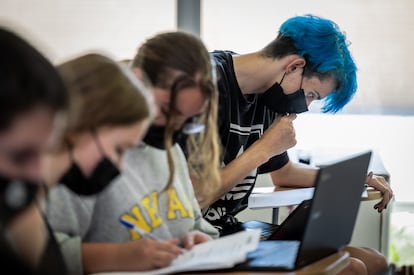Creator of the PISA report: ‘Spain’s system prepares students for a world that no longer exists’
Andreas Schleicher, director of Education and Skills at the OECD, backs the country’s latest education reform and applauds efforts to keep classrooms open during the pandemic
Andreas Schleicher is the man behind the PISA report, the largest and most influential international assessment of education, organized by the Organization for Economic Cooperation and Development (OECD). Born in Germany 56 years ago, Schleicher’s background is in physics, mathematics and statistics, and it was he who first developed the student evaluation system that is still being used two decades later. These days, Schleicher continues to coordinate PISA while heading the OECD’s Directorate for Education and Skills.
PISA measures the math, science and reading skills of 15-year-old students and provides an extensive comparative X-ray of various educational systems, with 79 countries participating in 2018; the next assessment will take place in the spring of 2022, having been postponed this year due to the coronavirus pandemic. Spanish students typically underperform in this test, despite spending more time in the classroom than their peers in many other countries.
The education reform in Spain, which replaces a system based on learning content by heart with one that requires students to develop the capacity to apply their knowledge, is one Schleicher has been following closely. He recently spoke to EL PAÍS about these and other related issues in a video conference from the OECD’s headquarters in Paris.
Question. What do you think of Spain’s education reform?
Answer. The angle Spain is adopting is very much in line with what we are seeing in many other parts of the world. Nowadays, assessment of young people is not about simply asking them to reproduce what they know, but to say to them: can you make sense of what you know? Can you apply your knowledge?
Q. In Spain, the education reform implies a big change from the current curriculum, which is often described as encyclopedic, with hundreds of very subject-specific items for students to learn and teachers to assess.
A. The current curriculum in Spain is, let’s say, a kilometer long and a centimeter thick, and I think it is not good for students. In the future, Spain should teach fewer things, but more in-depth, generating more understanding. Stacking up a lot of physics and chemistry content alone is not going to help you much. The question is: can you think like a scientist? Can you design an experiment? Do you understand the concept of cause and effect? Those are the most important things. And the same goes for history. Remembering all the names and places doesn’t help you. The question is: can you think like a historian and understand how the narrative of a society has emerged and evolved? School’s greatest achievement is to give young people strategies and attitudes that allow them to learn every day, but also to unlearn and relearn when the context changes.

Q. There’s an element of society in Spain that fears that the reform will impoverish students’ education.
A. Changing the curriculum always requires a lot of courage. We all get very anxious when our children stop learning what used to be important to us. And we get even more anxious when they start learning things we no longer understand. It’s a common phenomenon. But the world around us is changing. Things that were easy to teach and assess are also easy to digitize, automate and outsource, and they are disappearing from our environment.
Q. One of the criticisms of the reform is that it will have a particularly negative impact on students from families without the resources to provide them with additional knowledge outside of school.
A. There are many people in Spain who complete advanced university degrees and have difficulty finding a good job. And at the same time, Spanish employers say they can’t find people with the skills they need. That’s the fundamental problem. You have an education system preparing for a world that no longer exists and not preparing for the world we are seeing emerge. It’s hard for parents to accept that our children’s world is different from our own. But that’s what education is all about. Preparing students for their future, not our past.
Q. There are teachers that have also objected to the new education model.
A. If you have always taught in a certain way, changing your habits, approaches and beliefs is hard. I think it is very important to support teachers properly during the changes. You can’t just say: we changed the curriculum, you figure it out. The system must invest in helping them and preparing them. Otherwise, the changes won’t develop deep roots.
When the school closures took place, the country was also very quick to establish a digital alternative. The authorities have done well
Q. Some Spanish regions [which have devolved powers over education] have embarked on learning according to areas of knowledge and mixing subjects: for example, language and history or mathematics and technology, to make learning less compartmentalized and more applied. How does that strike you?
A. It is very important for students to be able to think beyond subject boundaries. Innovation today is not about being extremely good at a very narrow aspect of a subject. It’s about being able to connect the dots. So it looks very promising to me. But it’s very hard to get it right. If you want students to think across disciplinary boundaries, teachers have to collaborate across those boundaries. The history teacher and the language teacher have to work together to make sure it is properly implemented. It’s a simple idea and a good one, but getting it right takes a lot of skill.
Q. There has been a big difference in how long schools have been closed during the pandemic, even among developed countries. In Spain, schools have stayed open throughout the whole of this academic year, but in other places, closures have lasted more than a year. Why is that?
A. Spain has been very impressive in this respect. When the school closures took place, the country was also very quick to establish a digital alternative. The authorities have done well. The differences between countries have to do with the priority given to education by each society. Do you close shopping malls first or schools? Sweden never closed primary schools. Even when the situation with the pandemic was very serious, they considered them a priority. They also had the capacity to do so. It depends a lot on having teachers who can handle the pandemic appropriately within the school.
Q. Do you expect the impact of the pandemic to be reflected in the next edition of PISA?
A. Yes. For students from disadvantaged backgrounds, who haven’t been able to benefit much from digital learning, who don’t get a lot of support at home or don’t have teachers prepared to connect with them, I’m afraid it could be quite dramatic. But it will depend on the context; it’s hard to generalize. For some students, the experience may have had an interesting spin-off, pushing them to learn more on their own, develop self-discipline and use new resources. I think it will vary depending on the students’ prior preparation. And it will exacerbate inequality.
Q. In Spain, the regional governments plan to let go of a significant number of the 35,000 teachers hired during the pandemic. But the education community and the Education Ministry want them to be kept on to improve the quality of the system. Do you agree that they should stay on?
A. That’s a difficult one. It was a measure taken in response to the crisis and at some point, we have to readjust. I don’t think the quality of education depends so much on the number of people. If I were in Spain, I would not simply hire more people, I would also invest more in their training and in the environment in which students learn. The quality of learning has more to do with how well teachers are prepared, what kind of support they receive, how well they collaborate and the relevance of the curriculum.
English version by Heather Galloway.
Tu suscripción se está usando en otro dispositivo
¿Quieres añadir otro usuario a tu suscripción?
Si continúas leyendo en este dispositivo, no se podrá leer en el otro.
FlechaTu suscripción se está usando en otro dispositivo y solo puedes acceder a EL PAÍS desde un dispositivo a la vez.
Si quieres compartir tu cuenta, cambia tu suscripción a la modalidad Premium, así podrás añadir otro usuario. Cada uno accederá con su propia cuenta de email, lo que os permitirá personalizar vuestra experiencia en EL PAÍS.
¿Tienes una suscripción de empresa? Accede aquí para contratar más cuentas.
En el caso de no saber quién está usando tu cuenta, te recomendamos cambiar tu contraseña aquí.
Si decides continuar compartiendo tu cuenta, este mensaje se mostrará en tu dispositivo y en el de la otra persona que está usando tu cuenta de forma indefinida, afectando a tu experiencia de lectura. Puedes consultar aquí los términos y condiciones de la suscripción digital.









































